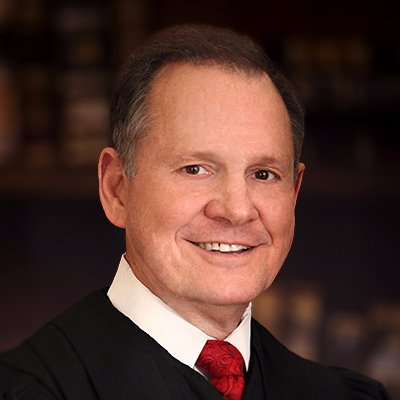
NEW YORK — Alabama Republican Roy Moore has celebrated his isolated fight against the political establishment in both parties. The outsider story may resonate with Alabama voters, but the reality has a clear downside: The Senate candidate and his allies are almost completely cut off from the GOP’s traditional donor network and struggling to raise money for the final-weeks sprint to Election Day.
Federal fundraising reports released Friday reveal that Moore is losing the battle for campaign cash to Democrat Doug Jones. And he’s losing badly.
Moore raised $1.7 million from Oct. 1 to Nov. 22, according to a filing with the Federal Election Commission. Jones raised $9.9 million over the same period.
The dramatic disparity has allowed the Democrat to dominate the Alabama airwaves and get-out-the-vote efforts with the Dec. 12 election fast approaching. Money isn’t always deciding factor — particularly for a Democrat running in conservative Alabama — but Moore’s struggle hasn’t helped his effort to fight back against allegations of sexual misconduct that prompted much of his party’s leadership to turn their backs on his bid.
Abandoned by many GOP donors, Moore is now looking to President Donald Trump and his political network for a final-days boost.
On the same week that the White House said the president would not campaign in Alabama on Moore’s behalf, Trump agreed to headline a campaign-style rally in Pensacola, Florida — less than 20 miles from the Alabama border — just four days before the Alabama election.
At the same time, a political group aligned with former Trump strategist Steve Bannon is spending at least $150,000 on a new television, radio and digital advertising campaign set to begin running across Alabama on Saturday. The investment, which is largely aimed at attacking Jones, could swell to $400,000 to help counter Democrats’ steady advertising dominance in race, according to Great America Alliance senior adviser Andy Surabian.
The Trump-aligned super PAC, America First Action, has been polling the Alabama race and could follow Great America’s lead, according to spokeswoman Erin Montgomery.
But on the ground in Alabama, the super PAC created to benefit Moore directly, Proven Conservative PAC, has failed to attract big money, according to John Giles, who leads the group. His organization made specific pitches to several major donors across the country in recent weeks seeking between $7 million and $8 million. Almost all of the appeals were rejected, Giles said.
He blames the national Republican establishment, particularly Senate Majority Leader Mitch McConnell, for the money woes.
“Our largest handicap to raising money has been Sen. McConnell,” Giles said, adding that he believes McConnell’s calls for Moore to leave the race have had a chilling effect on donors.
Proven Conservative filed a fundraising report with the Federal Election Commission this week that showed receipts of less than $80,000 since The Washington Post first published the accounts of women who accused Moore of sexual misconduct, including one who said he molested her when she was 14 and he was in his 30s. More than half of the recent receipts — $50,000 — came from one donor, Illinois-based Republican Richard Uihlein.
Moore has denied the accusations. Yet prominent Republican fundraisers note that Moore was unpopular among mainstream donors long before explosive allegations surfaced about his past.
“The lack of donations, for a lot of people, I don’t think has anything to do with the allegations,” said Spencer Zwick, who leads national fundraising efforts for House Speaker Paul Ryan.
Zwick said donors have kept their distance largely because of Moore’s turbulent history in Alabama, where he was twice removed from his position as the chief justice of the state Supreme Court for letting his Christian conservative values interfere with his judicial decisions. The first time he disobeyed a federal court order to remove a Ten Commandments monument from the lobby of the state judicial building, and the second he urged state probate judges to defy the U.S. Supreme Court decision that legalized gay marriage.
Zwick cited “a scarcity of time and dollars” in explaining his decision not to send money to the Alabama Republican. “Roy Moore is unfortunately just not on my radar,” he said.
Desperate for fundraising dollars, Moore highlighted his money troubles in a pitch to new donors this week.
His campaign issued a “Defeat the Elite money bomb” on Tuesday declaring that he needed help because his Democratic opponent was outspending him 10-to-1 by one account. The “money bomb” was designed to raise $300,000. Three days later, the appeal had raised less than $65,000, according to the fundraising website on Friday evening.
“I am facing enemy fire from all angles,” Moore wrote in the fundraising appeal. “Of course, I refuse to back down or give up — no matter the costs. But resources are limited.”
Backed by their fundraising advantage, Democrats have spent far more money on the Alabama Senate contest than Republicans since Moore clinched his party’s nomination in late September.
Jones and his allies spent $6.1 million on television and radio advertising between Sept. 26 and Wednesday, according to campaign officials monitoring spending in the race. By contrast, Moore and his allies spent just $1.1 million. The totals include television advertising reserved through Election Day.
Jones’ flood of cash is coming from unusual places in some cases.
California-based Republican strategist Tim Miller, who previously worked for Jeb Bush’s presidential bid, made his first-ever donation to a Democrat last week. He gave Jones less than $200, a small but meaningful gift that he promoted on social media, he said.
Nearly 56,000 people liked his tweet, which linked to a Jones’ fundraising page, and another 17,000 shared it.
“Given all the re-tweets, I probably raised more money for Doug Jones than I ever raised for Jeb,” Miller said. He opposes most of Jones’ policies, but called the Democrat “a better option than someone who’s a child molester who feels that gays should be in jail.”